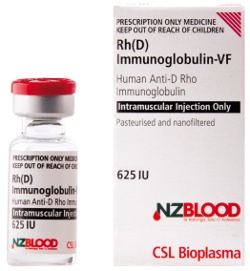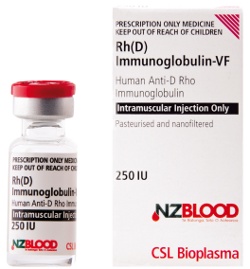Presentation
- Rh(D) Immunoglobulin-VF (Anti-D) in 2mL vial (with variable volume inside)
- 250 IU and 625 IU of anti-D antibody for intramuscular use. (In other countries this would be referred to as 50 micrograms and 125 micrograms respectively.)
- If Anti-D needs to be given intravenously (large doses or thrombocytopenia), please contact Blood Bank for advice.



Queeny's story
ABO Compatibility
- Compatibility is not relevant for manufactured (fractionated) plasma product transfusion
Storage
- If any delay store at 2-8°C in a blood or vaccine fridge. Domestic fridges are not recommended due to the variable temperature control.
Precautions
- If Anti-D is given for large fetomaternal bleeds, febrile reactions due to haemolysis of the Rh(D) positive cells are common. Consider pre-medicating with paracetamol and ensure the patient is well hydrated.
- Read manufacturer's instructions carefully
- Always observe for turbidity, floating material and sediment
- Intra-muscular use - follow recommended best practice.
- Specific information is given in the manufacturer's product information
- Although the manufacturer has raised concerns about giving Anti-D to women with a BMI greater than 30, an Expert Consensus Position Statement, endorsed by NZBS, has made somewhat different recommendations.
Kleihauer testing
- Kleihauer testing is indicated in Rh(D) negative women where in the following circumstances:
- at or after 20 weeks gestation:
- Antenatal bleeding
- Termination of pregnancy
- Invasive procedures (amniocentesis, chorionic villus sampling)
- External cephalic version or significant abdominal trauma
- Following the birth of any Rh(D) positive or Rh(D) unknown baby, regardless of previous Anti-D administration
- A full dose of Anti-D (625 IU Rh(D) Immunoglobulin) will provide protection for up to 6mL of fetal red cells.
- For Kleihauer tests showing greater than 6mL fetal red cells, please contact a Transfusion Medicine Specialist (see Need Advice)
- If you request a Kleihauer test, please remember to follow up the result, or hand it over if the patient is discharged or care transferred to someone else.
Routine antentala anti-D prophylaxis
- Routine antenatal anti-D prophylaxis is recommended by RANZCOG for Rh(D) negative women. 625 IU RhD Immunoglobulin is administered at 28 and 34 weeks gestation. Please see the following guidance leaflets:
Administration
- Rh(D) Immunoglobulin (CSL's Anti-D) may only be given intra-muscularly.
- If Anti-D needs to be given intravenously - if the patient is thrombocytopenic or if large dose of Anti-D immunoglobulin is required (a large fetomaternal bleed) - please contact Blood Bank for advice
Monitoring
- Recipients should remain under observation for 20 minutes following administration in case they experience an immediate adverse event requiring treatment.
DO NOT
- DO NOT add medications to blood products.
Dose
- For first-trimester indications only: 250 IU
- Post-partum or following an antenatal sensitising event after 12 weeks gestation, or following termination after 12 weeks: 625 IU
- For fetomaternal bleeds (positive Kleihauer test): 625IU for bleeds less than 6mL fetal red cells.
- For fetomaternal bleeds greater than 6mL or for other indications, please consult a Transfusion Medicine Specialist (see Need Advice)
- For other exposures to Rh(D) positive red cells (e.g. platelet transfusions or tissue implantation), please consult a Transfusion Medicine Specialist (see Need Advice)
More Info
- Patient Information Leaflet
- Datasheet
- Transfusion Medicine Handbook
- RhD Immunoglobulin (Anti-D Immunoglobulin) During Pregnancy and the Post-Partum Period Guideline on the use of Rh(D) immunoglobulin during pregnancy and the post partum period
- RANZCOG guideline on the use of anti-D immunoglobulin in obstetrics
- NZBS Clinical Compendium